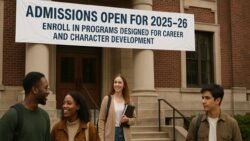Allied Health Courses – Students exploring 2025 admissions at stjohnspublicschool.org often ask which professional degrees deliver real classroom or clinical impact. For those who love teaching and community service, two pathways stand out: a Bachelor of Education (B.Ed.) that prepares you to teach with confidence across CBSE-linked schools, and Allied Health programs that power hospital care, diagnostics, and rehabilitation. A strong B.Ed. builds reflective practitioners grounded in pedagogy, assessment, and inclusive learning; quality programs follow the norms of the NCTE and align with school standards set by the CBSE. Allied Health courses, meanwhile, are guided nationally by the National Commission for Allied & Healthcare Professions (NCAHP), ensuring regulated curricula and ethical practice. Whether you’re planning a teaching career or a patient-care role, look for transparent eligibility, supervised practice, and outcome-focused training. As a school community, we encourage Class 12 graduates to choose courses that combine accreditation, internships, and career support—so your learning translates directly into employability.

Why a B.Ed. in 2025: Standards, Skills, and Career Pathways
A robust B.Ed. adds professional depth to your subject knowledge, emphasizing child development, assessment literacy, classroom technology, and inclusive education. Programs recognized by the NCTE generally include school internships, micro-teaching, and reflective portfolios that strengthen your classroom readiness. If you aim to teach in CBSE-affiliated schools, ensure your B.Ed. aligns with curricular expectations published by the CBSE and embraces competency-based learning promoted in the National Education Policy (NEP) 2020. Admissions typically require a bachelor’s degree with minimum marks set by universities and state authorities; for recognition and quality signals, many institutions also reference UGC and NAAC frameworks. Graduates can pursue roles as PRT/TGT/PGT (based on subject specialization and qualifying tests), academic coordinators, special-needs resource teachers (with additional credentials), or ed-tech facilitators. Prioritize programs that integrate school observation, mentorship by master teachers, and digital pedagogy for blended and experiential learning.
Allied Health in 2025: Regulated Courses That Drive Healthcare Teams
Allied Health professionals are the backbone of diagnostics, therapy, and community health outreach. India’s regulatory landscape has been strengthened by the NCAHP under the Allied & Healthcare Professions Act, 2021, which sets national standards for education and professional conduct across domains like Medical Laboratory Technology, Radiography & Imaging, Physiotherapy, Occupational Therapy, Optometry, and Emergency & Critical Care Technology. Globally, the WHO Health Workforce underscores how such roles expand access and quality. When shortlisting courses, verify program recognition under relevant councils, structured clinical postings, simulation-lab exposure, and supervised internships in NABH/NABL-accredited settings. Typical eligibility includes Physics-Chemistry-Biology/Math at Class 12, with merit lists or entrance tests as prescribed by universities or states. Graduates can progress into hospital departments, diagnostic chains, community programs, or device and health-tech roles, with scope for postgraduate specialization and research.
 Admissions Open for 2025–26 – Enroll in Programs Designed for Career and Character Development
Admissions Open for 2025–26 – Enroll in Programs Designed for Career and Character Development
Admissions Checklist: What Parents and Students Should Verify Before Applying
Before committing to any B.Ed. or Allied Health program, validate recognition, curriculum, and placements. For teaching, confirm NCTE recognition (NCTE) and alignment with CBSE competencies (CBSE). For healthcare, check whether the course appears under categories regulated by NCAHP or relevant councils, and whether hospitals/diagnostic centers used for training carry quality badges (NABH/NABL) via NABH and NABL. Ask about supervised internship hours, student-patient safety protocols, and faculty qualifications. Review fee breakdowns, scholarships through the Ministry of Education, and potential skill add-ons with the NSDC. Prioritize programs that publish learning outcomes, assessment rubrics, and exam patterns in advance. Finally, evaluate career services—mock interviews, portfolio building, and campus-recruitment partners—so your transition from school to professional training is seamless.
Career Readiness: Internships, Certifications, and Bridge Skills for 2025
Internships are where theory meets real learners or patients. A quality B.Ed. will schedule graded school internships aligned to NCTE norms, with documented teaching practice, mentorship logs, and feedback cycles. Allied Health courses should include rotations across labs, imaging suites, ICUs, or rehabilitation units, following safety and ethics guidelines emphasized by the WHO. Ask institutions about digital tools (LMS/e-portfolios), first-aid/BLS certifications, and simulation training for emergencies. Soft skills—communication, empathy, documentation, and inter-professional teamwork—are now as crucial as technical mastery. For added employability, explore industry micro-credentials or skilling initiatives via the NSDC. Whether you aim for a classroom or a clinic, combining recognized degrees with internships, certifications, and reflective practice will position you strongly for 2025 hiring cycles and beyond, while keeping your learning grounded in real-world impact.




